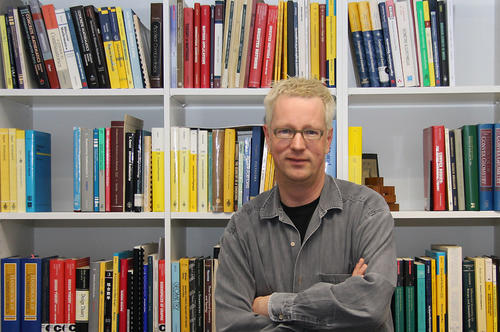Giving Mathematics a Face
Günter M. Ziegler appointed professor of discrete geometry at Freie Universität starting in March
Mar 24, 2011
The mathematician Günter M. Ziegler has recently accepted an appointment at Freie Universität and heads the discrete geometry group.
Image Credit: Gisela Gross
The press hails him as a “math guru,” his publisher calls him “Germany’s smartest math professor,” and his subject has been called “8,000 percent cool.” Günter M. Ziegler has made a major contribution to the more positive image math now enjoys among the public. Amid all this, he still makes sure to have time for actual calculations, as he shows in his activities, including as the head of the 25-person Discrete Geometry Working Group, which he brought with him from Technische Universität Berlin to the Dahlem campus of Freie Universität.
Ziegler is not an ivory tower kind of academic. The doors to his office, on the ground floor of the newly renovated “Mathematics Villa” on Arnimallee, are open, with a view of the garden. But the lovely office was not the only determining factor in his decision to move after 16 years as a professor at Technische Universität Berlin, says Ziegler. His longstanding roots in mathematics in Berlin combined with a desire for change to bring the 47-year-old professor to Dahlem – and with him, the 25 researchers of the Discrete Geometry Working Group. “To me, doing math is something that involves a lot of dialogue; it happens together with doctoral candidates, postdocs, and students finishing a Diplom program.” In the process, he relies less on technological aids; when solving a problem, the former president of the German Mathematical Society relies on a classic pad of graph paper, a pencil, and his reference books.
Discrete mathematics deals with countable objects, by contrast to smooth, continuous processes. Ziegler describes his subject thus: “I work with geometric objects that are made up of infinitely many components, like with scaffolding or glass roofs.” As for what, exactly, he does, that’s a question Ziegler hears all the time, and one that has brought him into the public spotlight more and more often over his career. It all started out with a lecture on public perceptions of mathematics, which he gave in 2001, as a newly minted recipient of the Leibniz Prize. It had consequences: “It was partly because of that lecture that I was admitted to the Academy of Sciences. Then the first publisher wanted to bring out a math book for youth. And I noticed that it didn’t tarnish my image as an academic if I worked with the public,” says Ziegler, who began winning math competitions even before he was out of school and earned his postdoctoral authorization to teach at German universities (Habilitation) at the age of just 29.
Ziegler has a certain maxim: “If you defend yourself, you’re a loser.” He explains: “If I write that math was awful for many people in school, but that I will now explain anyway why it’s thrilling – then I’ve already lost.” The same view informed the book Darf ich Zahlen? (2010, Piper), in which Ziegler tells stories from the realm of mathematics as he would among friends. The book took him to TV Total, a program hosted by celebrity Stefan Raab.
The publisher would welcome a follow-up title, but Ziegler’s schedule is packed. Until 2015, he is involved in a research project that brings together discrete geometry and topology with topics in numerical analysis, which has received 1.85 million euros in funding from the European Research Council (ERC). Cultivating junior academic talent, travel, networking – alongside pure mathematics, it’s all part of Ziegler’s job. He also plans to get involved in training and continuing education opportunities for teachers at Freie Universität. “And in my free time, I write my column for the Mitteilungen der Deutschen Mathematiker-Vereinigung, the society’s journal. I do all of it with pleasure,” he emphasizes.
Ziegler’s efforts to communicate his enthusiasm for math have been supported since 2008 by a media office, which handles activities during initiatives such as MatheMonatMai (May Math Month) and the Year of Mathematics. With his activities, Ziegler says he is happy to join colleagues such as Ehrhard Behrends, Konrad Polthier, and Christof Schütte in the ranks of the math professors at Freie Universität who also successfully present a multifaceted picture of their subject in public. For this year’s Long Night of the Sciences (Lange Nacht der Wissenschaften) as well, there are already joint plans at the Institute of Mathematics. One working title certainly sounds promising: “Beat the prof.”
Further Information
- Prof. Günter M. Ziegler, Institute of Mathematics
Tel.: +49 (0)30 / 838-75668, Email: ziegler@math.fu-berlin.de

